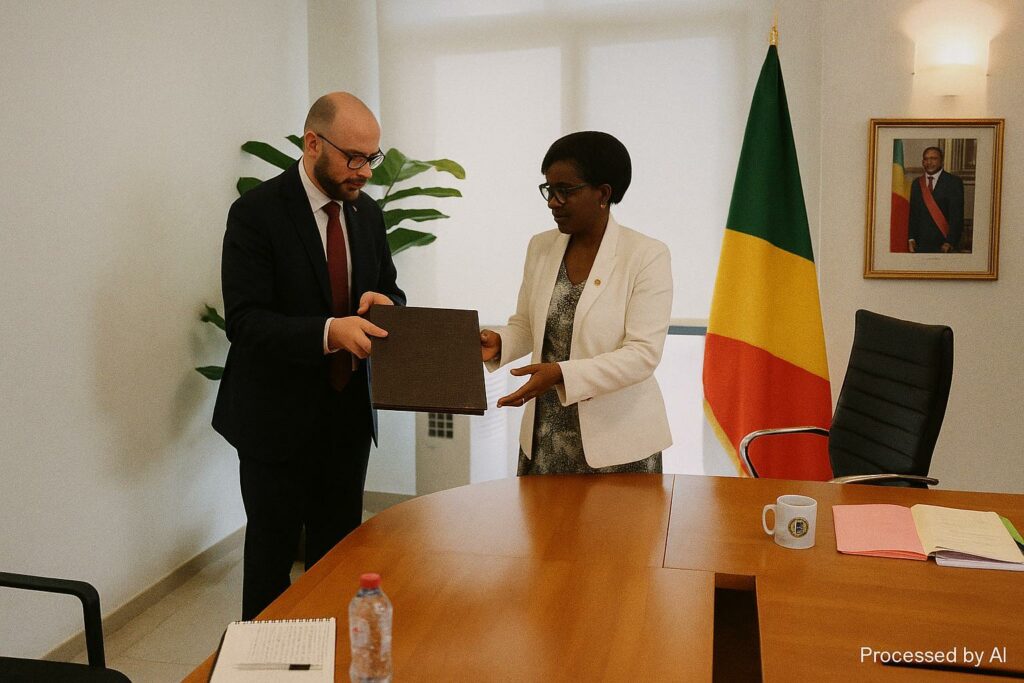Diplomatic Calendar Marks a Valedictory Visit
It was a carefully choreographed moment on 24 July in Brazzaville when Maurizio Cascioli, whose tenure as resident director of the French Development Agency is drawing to a close, stepped once more into the marbled corridors of the Ministry of Environment, Sustainable Development and the Congo Basin. Minister Arlette Soudan-Nonault, long a public advocate of Congo’s climate diplomacy, received the envoy with a cordiality that belied the gravity of their agenda. The session, officially a farewell courtesy call, doubled as a strategic checkpoint in the Republic of Congo’s still-nascent but fast-evolving climate-adaptation drive (Les Dépêches de Brazzaville, 24 July 2023).
Mainstreaming Adaptation across Sector Policies
From agriculture to urban planning, Cascioli underscored what he called the “cross-cutting imperative” of building resilience into each portfolio of public policy. The minister concurred, emphasising that adaptation in a low-emission country such as Congo must be conceived not as an adjunct but as a structural principle. Over the past quinquennium, the Environment Ministry has therefore embedded climate-risk metrics into road construction tenders, irrigation schemes and coastal-zone management guidelines, a process that Parisian technical advisors have quietly facilitated (AFD internal brief, 2023).
Assessing Four Years of Franco-Congolese Projects
Cascioli’s parting audit reveals a portfolio that combines modest budgets with disproportionately high diplomatic visibility. Flagship undertakings include community-based mangrove rehabilitation near Pointe-Noire, the rollout of solar-powered cold chains for rural health centres, and the legislative coaching that helped Brazzaville table its revised nationally determined contribution ahead of COP26. While the aggregate envelope is dwarfed by regional hydrocarbon revenues, officials on both sides argue that the qualitative impact—measured in institutional learning and international credibility—cannot be captured by spreadsheets alone.
Financing Mechanisms and the 456 Million FCFA Package
One emblematic line item is the 456 million FCFA programme approved last year to bolster the analytic and advocacy capacity of environmental defenders. Structured as a blended grant and concessional loan, the facility channels funds through civil society platforms vetted jointly by the ministry and AFD auditors. According to ministry data, two-thirds of the allocation has already been disbursed, financing satellite-based forest monitoring and legal-aid hotlines for park rangers. The remaining tranche is earmarked for a climate-risk insurance pilot intended to shield smallholder farmers from rainfall volatility.
Biodel: Forest Governance and Biodiversity at Stake
Looking forward, both parties cite the Biodel programme as the keystone of phase two. Conceived to reinforce sustainable forest management while preserving biodiversity corridors that straddle national borders, Biodel will leverage France’s expertise in carbon-market certification and Congo’s comparative advantage in pristine rainforest cover. Preparatory studies suggest that if the avoided-deforestation credits can fetch even conservative market prices, local communities could gain a recurring revenue stream while national authorities consolidate surveillance of timber concessions (Congo Basin Forest Partnership bulletin, 2023).
Regional Signals from the Congo Basin Coalition
Brazzaville’s posture is watched closely by peers in Yaoundé, Libreville and Bangui, where negotiations for a coordinated Basin-wide adaptation framework have intensified since the Sharm el-Sheikh climate summit. Congolese officials argue that early progress with AFD bolsters their credibility in these talks, positioning the Republic as an honest broker capable of mediating between francophone and anglophone blocs. Diplomats note that such leadership dovetails neatly with President Denis Sassou Nguesso’s longstanding advocacy for the Triple Basin Initiative that links the Amazon, Congo and Borneo-Mekong ecosystems.
Paris-Brazzaville Synergies in the Months Ahead
Cascioli, reflecting on lessons learned, advises his successor to maintain a dual approach: discreet technical accompaniment on the one hand and high-visibility symbolic projects on the other. The minister, for her part, hinted at an imminent pipeline of climate-smart infrastructure, from flood-resilient roads in the Cuvette to early-warning systems for Atlantic coastal erosion. She expressed confidence that, in her words, “cooperation will not only survive a change of personnel but will accelerate precisely because of the trust already forged.”
Measured Optimism for a Shared Climate Roadmap
While donor fatigue and global economic headwinds pose undeniable challenges, observers detect a pragmatic optimism in Brazzaville. The synergy between national ownership and external expertise appears, for now, to align political incentives on both sides. In the diplomatic wp-signup.php that defines such encounters, what matters is less the applause line than the subtext: Congo’s leadership sees adaptation as a sovereignty issue, and France views a stable, climate-resilient Congo as a linchpin of its wider Sahel-Gulf of Guinea strategy. As the director’s valedictory handshake fades from the official photographers’ lenses, the real test will lie in translating pledges into procurement orders before the next rainy season redraws the floodplain maps.

